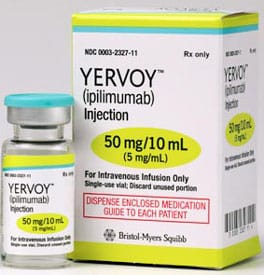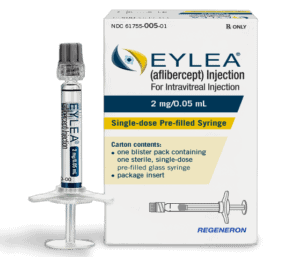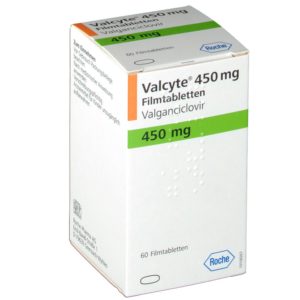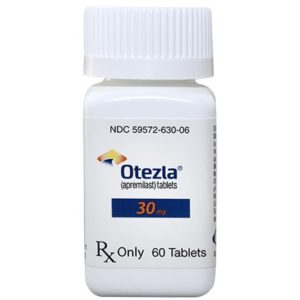What is Ipilimumab?
Ipilimumab injection is used in combination with nivolumab to treat advanced or incurable melanoma (a kind of skin cancer). It is a monoclonal antibody that alters the immune system in order to aid in the suppression of skin cancer cell proliferation.
Indications of ipilimumab?
Ipilimumab is authorized to treat the following conditions:
- Adults and children 12 years and older with colorectal cancer. Ipilimumab is used in combination with nivolumab to treat metastatic microsatellite instability-high (MSI-H) or mismatch repair deficient (dMMR) cancer that has progressed following treatment with fluoropyrimidine, oxaliplatin, and irinotecan hydrochloride.
- Hepatocellular carcinoma (a type of liver cancer) – Ipilimumab is used in combination with nivolumab in individuals who have previously had sorafenib. ¹
- Pleural mesothelioma that is malignant. Ipilimumab is used in combination with nivolumab as the initial treatment for adults with cancer that cannot be removed surgically.
- Melanoma – Ipilimumab is used as adjuvant therapy in patients who have had skin and lymph node melanoma removed surgically.
- Ipilimumab is used to treat adults and children 12 years of age who have cancer that cannot be surgically removed or has metastasized (spread to other parts of the body).
Ipilimumab mechanism of action
It is a humanized antibody directed against an activated T cell down-regulatory receptor. The postulated mechanism of action is to prevent T-cell inactivation, so allowing natural melanoma-specific cytotoxic T cells to expand.
Ipilimumab Dosage
Intravenous
Melanoma that has spread metastatically
Adults: 3 mg/kg through 90-minute infusion every three weeks for a total of four doses. Doses may be delayed in the event of toxicity, but all treatment must be initiated within 16 weeks following the initial dose, or changed according to the product documentation.
12 years old child The dose is identical to that for adults.
Intravenous
Adults: As adjuvant therapy in individuals with cutaneous melanoma who have undergone full resection and have pathologic involvement of regional lymph nodes >1 mm: 10 mg/kg IV over 90 minutes every three weeks for a total of four doses; thereafter 10 mg/kg IV every 12 weeks for up to three years or until proven illness recurrence or intolerable toxicity. In the event of toxicity, omit or alter the dose/s in accordance with the product information.
Administration
Contrary to popular belief, do not combine or provide as an infusion with other therapeutic medications. After each dose, flush the IV line with 0.9 percent NaCl or D5W.
Ipilimumab side effects
Ipilimumab has the potential to induce adverse effects. Inform your doctor if any of the following symptoms are severe or persistent:
- Inability to fall or keep asleep
- Joint discomfort
- Decreased urination, blood in the urine, foot, ankle, or lower leg edema, or loss of appetite.
- Symptoms of diarrhea include crimson or black feces, tarry, sticky stools, severe stomach discomfort or tenderness, and fever.
- Cough, chest discomfort, or breathlessness.
- Fatigue, disorientation, memory difficulties, hallucinations, seizures, or a stiff neck.
- Fatigue, increased hunger, thirst, urination, or weight loss.
- Rapid heartbeat, uncontrollable shaking of a specific body area, or excessive perspiration.
- Weariness or sluggishness, increased susceptibility to cold, constipation, muscular ache and weakness, weight gain, menstrual periods that are heavier than normal or irregular, thinning hair, headache, dizziness, irritability, forgetfulness, diminished sex drive, or depression.
- Yellowing of the skin or eyes, dark (tea-colored) urine, upper right stomach pain, nausea, vomiting, or easy bruising or bleeding.
- Unexpected leg, arm, or facial weakness; or numbness or tingling in the hands or feet.
- Rash, itchy or not, blistered or peeling skin, or mouth sores.
- Vision disorders such as blurred vision, double vision, eye pain or redness, or other vision issues.
Drug interaction
The following are some of the blessed thistle’s mild interactions:
- Hydroxide of aluminum
- Carbonate of calcium
- Cimetidine
- Dexlansoprazole
- Esomeprazole
- Famotidine
- Ibuprofen/famotidine
- Lansoprazole
- Nizatidine
- Omeprazole
- Pantoprazole
- Rabeprazole
- Ranitidine
- Bicarbonate of sodium
- Citrate de sodium/citric acid
Ipilimumab precautions/ safety information
Before beginning ipilimumab treatment, inform your doctor of any additional medications you are currently taking (including prescription, over-the-counter, vitamins, herbal remedies, etc.). While taking ipilimumab, do not obtain any type of vaccination or immunization without your doctor’s clearance.
Storage
Keep the diluted solution refrigerated (2°C to 8°C, 36°F to 46°F) or at room temperature (20°C to 25°C, 68°F to 77°F) for no more than 24 hours.
Contraindications
- Hyperactive thyroid gland.
- Thyroid hypothyroidism is a condition characterized by low thyroid hormone levels.
- Hypopituitarism is a pituitary hormone deficit.
- Substantial impairment of the adrenal cortex’s function.
- Peripheral neuropathy is a painful disorder that affects the nerves in the legs and arms.
Pregnancy or lactation
Pregnant women or those planning to become pregnant. ipilimumab may be harmful to an unborn child.




